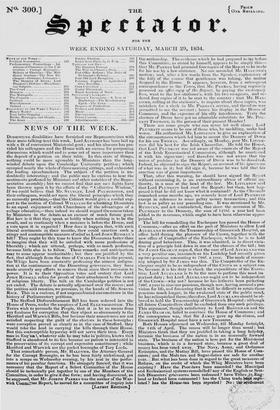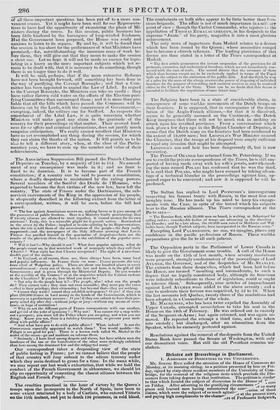NEWS OF THE WEEK.
DISSENTING disabilities have furnished our Representatives with their main talking-text this week. Lord ALTHORP has been laid up with a fit of convenient Ministerial gout ; and his absence has pro- vided his colleagues and the House with an excuse for postponing discussions which would end in some act of more importance than the deposit of a petition on their table. In this state of things, nothing could be more agreeable to Ministers than the long- winded debate upon the Cambridge University petition; wine% occupied nearly the whole of' three morning sittings, and exhausted the leading speechmakers. The subject cf the petition is un- doubtedly interesting ; and the public may be curious to hear the sentiments professed by Ministers and other notables of the Repre- sentative assembly; but we cannot find that any new lights have been thrown upon it by the efforts of the " Collective Wisdom." if we could believe that Mr. STANLEY, Lord PALMERSTON, and their colleagues, would act upon the liberal principles which they so earnestly proclaim,—that the Cabinet would give a cordial sup- port to the motion of Colonel WILLIAnS for admitting Dissenters to an equal enjoyment with Churchmen of the advantages of a college education,—then indeed we should regard the course taken by Ministers in the debate as an earnest of much future good. But how is it that they speak so boldly when nothing is to be the result, and so cautiously when a measure is before the House, and a vote upon it is expected ? How does it happen that, with such liberal sentiments in their mouths, they could sanction such a stingy and contemptible measure of relief as Lord JOHN RUSSELL'S bill ? They ought by-this time to know the Dissenters better than to imagine that they will be satisfied with mere professions of liberality; which are uttered, perhaps, with so much profusion, because little else is to follow. These remarks and anticipations may to some appear uncharitable; but they are justified by the fact, that although from the time of CHARLES Fox to the present, the Whigs have been constantly professing the utmost indigna- tion at the continuance of the Dissenting grievances, they have made scarcely any efforts to remove them since their accession to • power. It is to their Opposition votes and oratory that Lord JOHN RUSSELL refers for proofs of -their attachment to the cause of religious liberty. The talk on the Cambridge petition is not yet ended. The debate is actually adjourned over the recess; and the petition still remains, we presume, in the hands of Mr. SPRING RICE. This is a curious, if not unprecedented circumstance in the history of Parliamentary petitions.
The Stafford Disfranchisement Bill has been ushered into the House of Peers, under the auspices of Lord ELLENBOROUGH. The Tories wish to persuade the People, that it is by no means from any fondness for corruption that they object so strenuously to the Hertford and Warwick Bills, but because their consciences are not -satisfied respecting the guilt of the electors in these bormighs were corruption proved as clearly as in the case of Stafford, they would take the lead in carrying the bills through their House. But this contemptible hypocrisy will not serve tlieir turn. -; Every man in Eng'ant, whatever side he may take in'polities; kisokvs that 'Stafford is abandoned to its fate because no patron is intereitedin the preservation of its corrupt and expensive constituenci; While Hertford and Warwick are the pocket boroughs of Tory Lords.
That remarkable person, Mr. HALCOMB, the Attorney-General for the Corrupt Boroughs, as he has been fairly nicknamed, got into a scrape on Wednesday evening, by- his' Zeal 'in the -perfor- mance of his peculiar functions. He strangely fancied, that it was necessary that the Report of a Select Committee *of the ,House should be technically put together by one of the Members of the Committee, in order to give it due force; and having discovered, as he supposed, that Mr. JOSEPH PARKES was the author of the War- wick Comtee Report, he moved for a committee of inqpiry,into the authorship. The evidence which he had prepared to lay before this Committee, as stated by himself, appears to be simply this— that Mr. PARKES had procured four copies of the Report to be made
for his use by a law-stationer. No one seconded Mr. Hsncomn's motion; and, after a few words from the Speaker, explanatory of
the folly of' the course that gentleman was taking, the matter dropped in the House. It appears, however, from a subsequent correspondence in the Times, that Mr. PARKES, having regularly procured an office copy Of the Report, by paying the customary fees, went to the law-stationer-s, with his two co-agents., and or- dered four copies of it to be sent to the country ; that Mr. H A COMB, calling at the stationer's, to inquire about these copies, was mistaken for a clerk in Mr. PARKES s service, and therefore was permitted to see the account ; hence his display in the House of Commons, and the exposure of his silly interference. Truly the electors of Dover have got an admirable substitute for Mr. Pou- LETT Tnomsosr, ill the person of their present Member! There are some people who can never let well alone : Lord PLUNKETT seems to be one of those who, by meddling, make bad worse. He authorized Mr. LITTLETON to give an explanation of the circumstances which led him to accept the Deanery of Down for his son THOMAS. Accordingly, on Monday, poor Mr. LITTLE- TON did his best for the Irish Chancellor. He told the House, that Lord PLUNKETT was not aware of the contents of the Report of the Irish Ecciesiastical Commission, although be sancti,ined it with his signanire; and therefore was not aware that the union of parishes in the Deanery of Down was to be dissolved. Indeed, he objected to sight the Report, on account of his ignorance of what was in it; but did sign it, because he was told that his sanction was of great i in porta nee. That, after this warning, he should have signed the Report without examining it, is an extraordinary abuse of official au- thority, in a man at the head of the law. Mr. LITTLETON said that Lord PLusaisrr had read the Report; hut then, how hap- pened it that he did not know what it contained? As the chronicle remarked some months ago, we scarcely hear of Lord PLUNKETT except in reference to some paltry money transaction- and this last is as paltry as any preceding one. It was mentioned by Mr. RUTH WEN, and not contradicted, that since the accession of Mr. PLUNKETT to the Deanery, the sum of 1498/. a year had been added to its revenues, which ought to have been otherwise appro- 'printed. The bill for remodelling the Exchequer has passed the House of Commons,—after an effort on the part of Ministers to allow Lord AUCKLAND to retain the Treasurership of Greenwich Hospital, an office held during the pleasure of the Crown, together with the new office of Comptroller of the Exchequer, which he is to hold during good behaviour. This, it was admitted, is in direct viola- tion of a principle laid down in one of the clauses of the bill; but Sir JAMES GRAHAM argucd, that the case of Lord AUCKLAND was a very peculiar one, inasmuch,as his Lordship had recently given up two pensions amounting to 700/. a year. The mode of reason- ing adopted by Sir J Amss was this. The Comptroller of the Ex- chequer ought to be as independent of the Crown as a subject can be, because it is his duty to check the expenditure of the Execu- tive; Lord AUCKLAND is to be the man to perform- this most ilia portant-duty; but. Lord AUCKLAND ought not to be independent of the Crown—why not? because he has hitherto been pocketing 01. a year in sinecure pensions, though now, having secured a pro- vision for life, and foreseeing that it will be difficult to retain these pensions much longer, in the awakened state of the public mind, he has relinquished them; therefore, Lord AUCKLAND should be al- lowed to hold the Treasurership of Greenwich Hospital ; although all future Comptrollers shall be excluded from any such privilege. This argument, though satisfactory to Lord BROUGHAM and Sir JAMES GR 1m, failed to convince the House of Commons ; and the -Consequence was, that Sir JAMES gave up the clause, awl Greenwich Hospital must have a new Treasurer. Both Houses adjourned on Wednesday, till Monday fortnight, the -14th- of April. The recess will be longer than usual ; but Ministers-think that they are justified in taking a long holyda*, .becatVe the business of the nation is in an unusually forward state. The business of the nation is here put for the Ministerial busirfeSs, 'which . is in a forward state, because a great deal of moneybasbeen voted: away. The Navy, Army, and -Ordnance Estiinatesi:andthe Mutiny.Bill, have passed the House of Cora- -,nnonsi .and. the: Malt-tax. and Sugar-duties are safe for another yedr..:: But-what basbeen done in regard to the great measures of .Reform, on the credit of which the Whig Ministers have been existing? -Have the Poorslaws been amended? the Municipal
and Ecclesiastical systems remodelled? any of the English or Scot- tish Dissenters' grievances been redressed? have Tithes Rag- land Or It-eland been commuted ? has the China trade, regu-
lated? has the House-tax beep repealed ? 4o; ttt1en3eut
of all these important questions has been put off to a more con- venient season. Yet it might have been well for our Representa- tives to have had the opportunity of examining the plans of Mi- nisters during the recess. In this session, public business has been little hindered by the harangues of long-winded Irishmen. Had the Government been prepared, the House was ready and anxious to listen to its organs. By and by, it will be found that the session is too short for the performance of what Ministers have promised,—for, notwithstanding the immense mass of' work be- fore them, they still give out that they mean to make the session a short one. Let us hope it will not be made an excuse for legis- lating in a hurry on the more important subjects which yet re- main to be dealt with, that it is necessary to do something, though there is no longer time to do it well.
It will be said, perhaps, that if the more extensive Reforms have not been brought forward, still something has been done in the way of purifying the Corrupt Boroughs ; and that a Com- mittee has been appointed to amend the Law of Libel. In regard to the Corrupt Boroughs, the Ministers can take no credit : they have rather thrown cold water on the efforts of the Election-puri- fying Committees than encouraged them ; and it is more than pro- bable that all the bills which have passed the Commons will be thrown out by the Lords, with the concurrence of Government,— excepting, indeed, the solitary one for Stafford. As respects the amendment of the Libel Law, it is quite uncertain whether Ministers will make good any claim to the gratitude of the country for their proceedings in that matter. Their avowed fond- ness for ev officio and criminal informations, does not justify much sanguine anticipation. We really cannot recollect that Ministers have as yet accomplished any thing during the session, for which they can claim the thanks of the nation. It i1l gratify us to be atie to tell a different story, when, at the close of the Parlia- mentary year, we have to sum up the number and value of their achievements.



















